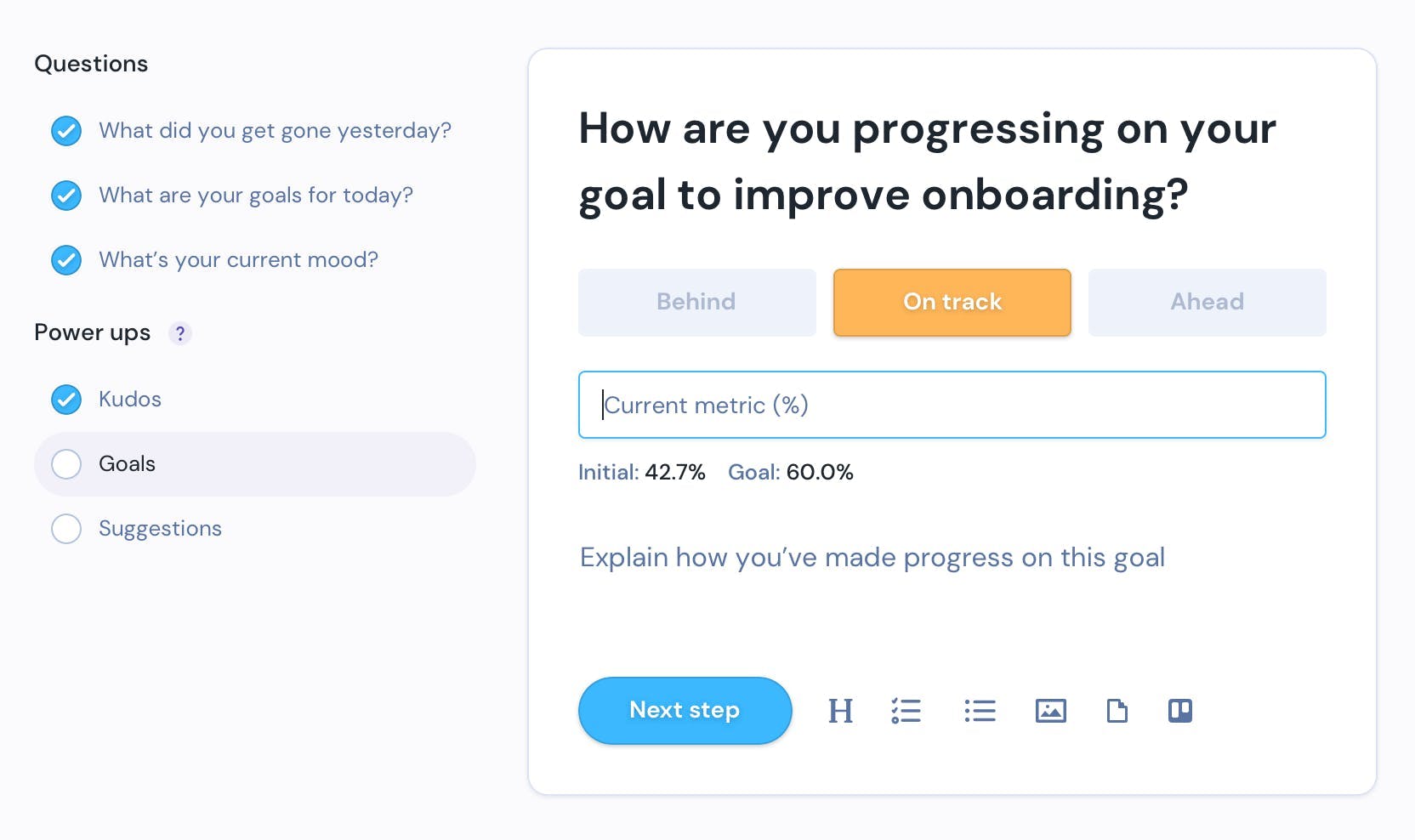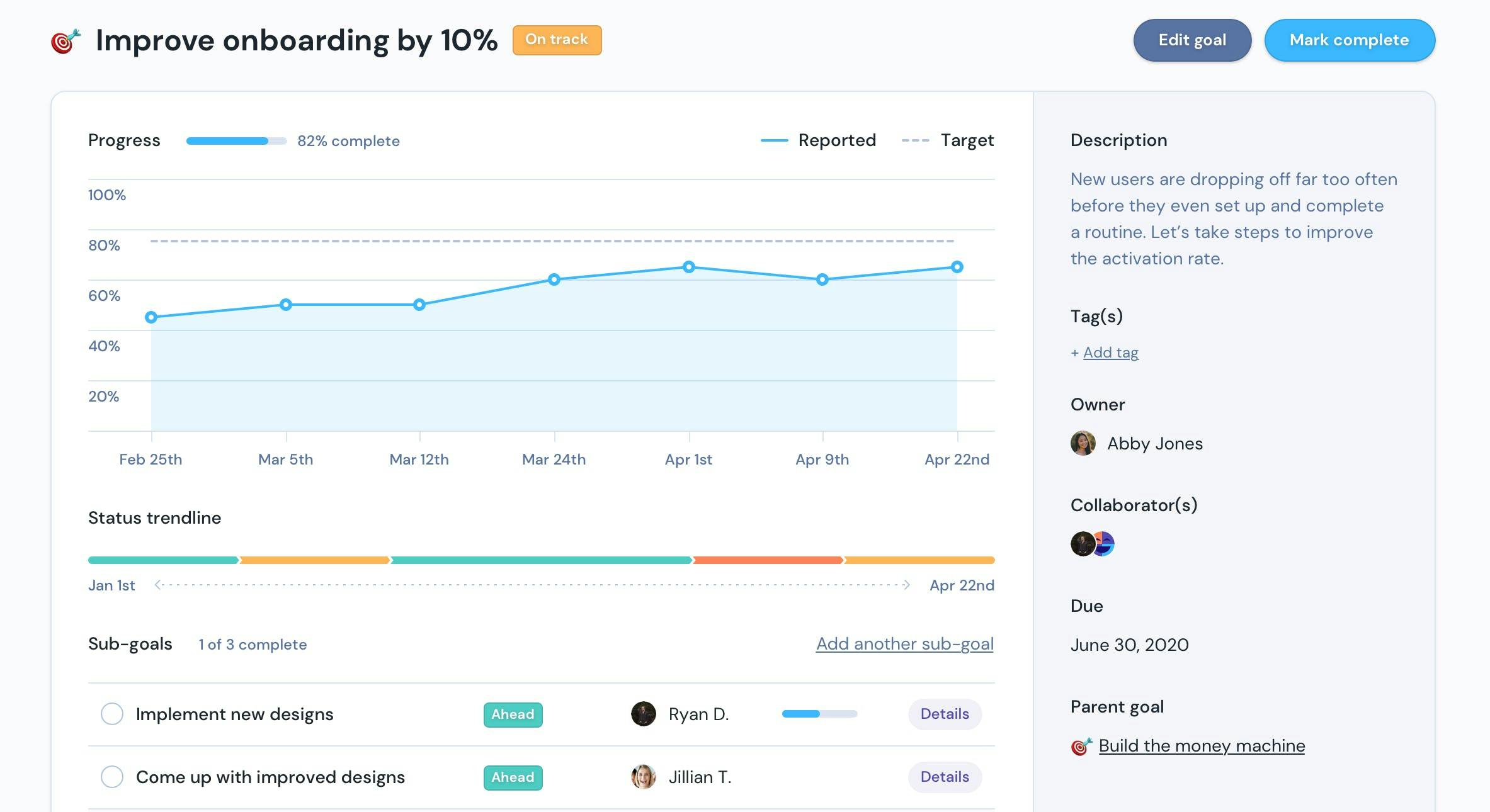7 Tips on How To Set Professional Goal (With Examples)

With so much work piled high on the desks, we can become blind to important opportunities outside of our regular work – developing skills, growing networks, collecting extra qualifications, chasing new experiences.
Unlike the common targets and deadlines one comes across in a given week, professional goals are entwined with personal development, a sincere desire to improve the self. While execs in boardrooms set company missions, thousands of hard-working employees fail to make time for their own future plans.
Setting professional goals can be massive for getting ahead in an office, broadening career prospects, and ultimately establishing a stronger sense of accomplishment and job satisfaction. Anyone who likes the sound of a lifetime of achievement needs to study up on how to set professional goals.
What Are Professional Goals? 9 Examples
Generally speaking, professional goals pertain to your career, while personal goals relate to yourself, yet both are linked to personal development. While meeting a quota or out-performing a quarterly projection is great, your professional goals feature less-tangible metrics, such as abilities/skills, job competency and career progression.
Common examples of professional goals include:
- Taking courses to develop new skills, such as in programming, sales, or design
- Gain more responsibility or duties as a manager or team
- Negotiation skills for a promotion/pay raise or a new sales opportunity
- Lead a challenging project to help you manage a team or to improve your own abilitiies
- Change job/industry to pursue a different path
- Start your own business and become an entrepreneur
- Increase your network. This could be through LinkedIn, Slack groups, or in local meet-ups via industry associations
- Improve your targets. We’ve talked a lot about goal-setting and what it takes to get there. It’s important to have a measurable goal that you can aim to accomplish. This could be large goals such as improving company revenue, but you’ll need smaller steps to get there, such as making a certain number of calls or building out certain aspects of a product.
- Attend a conference or speak at one. With the COVID-19 pandemic easing in some areas, there’s more of an opportunity to attend industry conferences, present, or lead a workshop at one of these industry events.
We’re familiar with the office as a world of numbers, whereby we’re constantly evaluating, and being ourselves evaluated, in terms of productivity against time. This compulsion conditions us to prioritize professional goals that generate explicit value – “I should make this call, as it may lead to x number of sales.” In essence, the motivation is monetary (outcome) and short-term.
Alternatively, professional goals focus on improving the way in which you approach the work, not the work itself – “I will attend this course to become better at making sales calls.” In essence, the motivation is methodological (process) and long-term.
How To Set Professional Goals with Friday
Friday integrates goal-setting software directly into our simple-to-use planner and operating system.
With Goals in Friday, you can:
- See key success metrics you’re trying to achieve for more focused productivity
- Share progress and provide context to key stakeholders to spend less time in meetings
- Set team goals and priorities, while also setting individual professional goals
- Know how the whole organization is doing with all goals in one view
- Connect goals to your everyday work. Strategy in action!
How to Set Professional Work Goals
Everyone will have their own unique criteria for setting goals, so we’re not here to lay down the law. What follows is our general guidelines, designed to increase your chances of accomplishing the professional goals you set.
1. Determine your Professional Value
You need to know your current value in order to set appropriate goals, which further your skills or potential. In order to do so, you should critically evaluate yourself. While most people’s experience of assessment comes in the form of an employee review, examining the strengths and weaknesses of oneself can be just as impactful.
If you don't know what your value is, you’ll have great difficulty in setting goals that are relevant. You may have to do some serious self-analysis, scouring through memories of projects you excelled at and situations you handled poorly. It may not sound thrilling, but it’s the critical first step towards improvement.
“When you self-assess you become an active participant in your own evaluation,” says the University of Virginia, “Your involvement enables you to honestly assess your strengths and also areas you need to improve.”
Here are some questions you may find useful to ask:
· What is my professional value?
· What skills/experience do candidates require in job positions that interest me?
· What could make me a more valuable professional?
· What distinguishes me from other professionals in the same field/position?
· Are there any available projects/assignments at work that would increase my value?
2. Be Ambitious, Yet Pragmatic
In order to realize your goals, you’ll need to ensure you’re balancing ambition with pragmatism. Though we firmly believe that everyone is capable of achieving amazing feats, we all share a tendency to be overly-optimistic when it comes to predicting future outcomes. The official term is optimism bias, and it’s fiendishly difficult to shake!
Be mindful of this mental disposition by managing expectations. If you set goals that are too ambitious, you will become discouraged, and possibly quit. If you set goals that are too pragmatic, you will become bored, and (you guessed it!) possibly quit. As with innumerable things in life, balance is key.
3. Frame Goals Specifically
Physics buffs are familiar with the famous thought-experiment “Schrödinger's Cat”, whereby a cat is enclosed in a box with a radioactive atom. As the atom could decay at any time, thus killing the creature, you cannot know the current state of your feline captive. So, as far as you can tell, it’s simultaneously dead and alive.
In a similar fashion, unless you frame your goals in terms of their specific fulfilment requirements, you can’t determine whether you’ve accomplished them or not. It’s Schrödinger's Goal, concurrently in-progress and complete. For example, a desire to “be a better employee” is painfully vague, so you’ll never know if you’ve attained it. Oppositely, “I will improve my skills in x by doing y” is a far more useful target.
Keep every professional goal as specific as possible. Ideally, have a concrete way of measuring progress to be sure of when you’ve completed it. Having clear goals is vital for a sense of accomplishment and self-reward.
If you need further help on setting goals, swing by our general goal-setting guide, which includes a section on goal-setting theory, the value of SMART goals, and a 5-step plan!
4. Identify Stepping Stones and Be Consistent
If you consider your goal a destination, you still need to find a pathway. In other words, having the goal is great, but you’ll need to recognize the ways through which you can get there.
There are various routes when working on professional goals:
· Read related books for insight or guidance
· Attend seminars or take credited classes
· Discuss training/tutor programs with your company
· Dedicate time at home to improve work skills
· Practice and progress on the job
While these are some of the general stepping stones useful for professional development, there are plenty of smaller techniques that will keep you on top of your goals. With grand ambitions, it’s especially important to break down large goals into more manageable, thus achievable objectives.
Remember that long-term professional goals are some of the biggest in life. You’ll need to learn how to recognize critical tasks amongst the riff-raff in order to prioritize effectively.
If you aren’t already, a daily checklist or to-do list is a brilliant start – in fact, you could keep a separate list exclusively for tasks related to your goals and then record your progress for your whole team to follow.
Here's an example of what goal tracking in Friday looks like:

5. Work, Get Feedback, Repeat
Knowledge is power, as the adage goes. If you want to be more successful with your work goals, it's important to collect as much feedback on your performance as possible. Receiving negative feedback is valuable for informing future goals, letting you know your areas for improvement.
Positive feedback, on the other hand, has a significant influence on self-confidence. An older Northeastern University study found that participants had increased performance expectancies when given positive feedback, versus lower estimations when feedback was absent.
A slightly unusual 2012 experiment had participants performing push-up exercises. The researchers found, across multiple test sessions, those who were given performance feedback saw drastically increased performance compared to those given no feedback. “Knowledge of results in a long term design,” they propose, “leads to significantly superior performances than when knowledge of results is denied.”
The implication is that while we of course appreciate a little lift now and again, regular feedback can have a huge impact on self-efficacy, which separate research shows hugely impacts goal-commitment. If you struggle to stay on track with long-term professional goals, don’t underestimate the value of feedback.
With a little fine-tuning, daily task reports can be a great source of information for both self-assessment and professional feedback
6. Commit to Your Goals
The general consensus is that goal-commitment is the moderator between set objectives and subsequent performance. “When goal difficulty levels are averaged,” one 2000 paper reads, “higher levels of commitment are associated with higher levels of performance,” accommodating the idea that one could outperform a better-equipped individual by having strong dedication to goals.
Although the idea that one must be committed to achieve goals is obvious, it’s not nearly as simple in practice. The critical component linking objective and performance is motivation. Sadly, there’s little anyone else can do to help you in that department, though there are multiple studies that support “a direct link between feedback and goal-commitment.”
With respect to professional goals, which often require long-term perseverance, maintaining motivation is essential. Without a sensible strategy, things are a hundred times harder, if not plain impossible. If you have previously been rather poor at sticking to goals, you will need to make behavioral changes, which can be extremely difficult.
Give yourself plenty of time to adopt more productive, goal-nurturing habits, such as following a daily schedule or bullet journal. If you are fully committed to a dream, there really is no limit to what you can accomplish.
7. Celebrate Success and Reward Yourself
There’s good reason to celebrate success, other than simply having some well-deserved fun! It’s widely acknowledged that motivation depends upon expectancy, your anticipated ability to complete the objective, and attractiveness, the reward or self-satisfaction upon doing so. In plain terms, you have to believe in yourself and get something worthwhile from it.
Expectancy is largely influenced by past achievement – when you can look back at previous success, it’s easier to believe in your future performance. When you celebrate success, you’re establishing a clear record of positive behavior that reassures you, instils a sense of accomplish and fuels self-efficacy, your belief in your abilities.
At the same time, a reward system is, by definition, an incentive to achieve your work goals, thus raising attractiveness. Whether they’re big or small, you should celebrate successes. Take the time to acknowledge your progress and savor success whenever it presents itself – it’s fine, we promise!
If the work becomes too strenuous, you’ll be discouraged to keep going, regardless of how amazing the end-result would be. So whether you’ve completed a milestone within a larger project, or have been consistently working hard and keeping good habits, it’s integral that you reward yourself when due.
In Friday, that could include sending kudos to your worker that accomplished their goal or celebrating when you reach your own! It's easy to track your progress:

Why Are Professional Goals Ignored?
Amid the office chaos, it’s all too easy to overlook professional goals. Countless businesses are in constant flux, repeatedly reshuffling, experiencing tumultuous bursts of energy and surprise setbacks, focused on just getting through one day at a time.
In such a stressful setting, many can’t afford to allocate time to long-term development or career goals, especially considering that their rewards are less noticeable. As a result, we’re easily convinced – either by managers or ourselves – that professional goals aren’t nearly as useful as just getting on with the work.
The “Mere Urgency Effect”, established by Professor Meng Zhu, dictates that urgent tasks elicit greater attention because a perceived time-constraint leads us to assume they’re important, regardless of whether they actually are. If we extrapolate this phenomenon for the working week, we’re far more likely to spend our time on the tasks we are told are urgent, despite the fact that professional development goals may hold far greater long-term value than these daily deadlines.
A 2017 survey saw 43% of respondents say “the organization’s overall commitment to professional development” was very important for them in a job, yet only 30% were satisfied with their current “career development opportunities for learning and professional growth.”
Thankfully, companies are beginning to realise the importance of promoting this growth, quickly discovering that employees given the opportunity to pursue professional development goals have higher job satisfaction, increased loyalty and better long-term productivity. It doesn’t matter whether you’re part of a large organization, run your own business, or somewhere in between, professional development goals shouldn’t be ignored.

